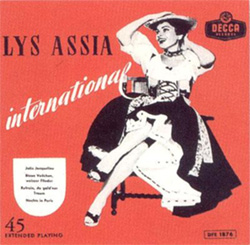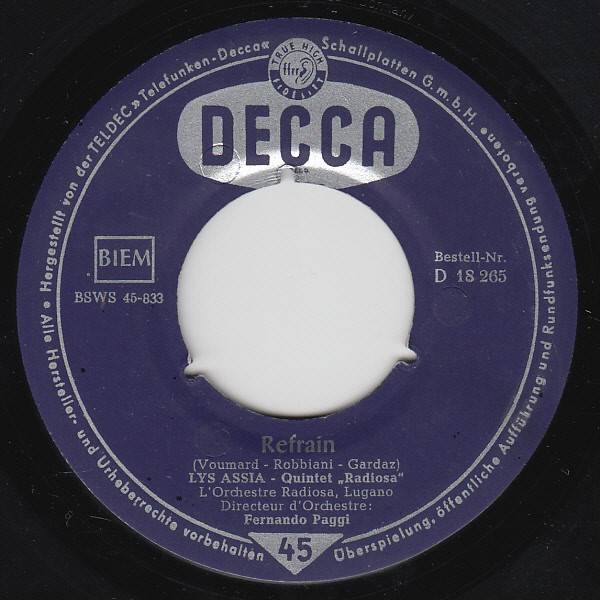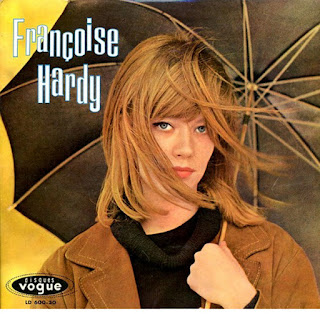When Eurovision was born....
As next weekend will see the 2022 Eurovision Song Contest in all its glory, I thought that this week we could take a trip down memory lane and look at the very first Eurovision contest, not least because it was won by a song sung in French - albeit not by a singer representing France...
Eurovision was the brainchild of a Swiss journalist and broadcaster, Marcel Bezonçon, who was also, from 1954, the director of the European Broadcasting Union (EBU). Noting the popularity of the annual San Remo Song Contest in Italy (first staged in 1951), he hit upon the idea of a Europe-wide contest, with the various members of the EBU submitting songs for inclusion. Fittingly for a Swiss creation, the first contest in 1956 was held in Lugano, at the Teatro Kursaal, with seven countries participating: Belgium, France, Germany, Italy, Luxembourg, The Netherlands and Switzerland.
Only four languages were represented in the contest. Three entries were sung in German (including one of the two Swiss entries), and two apiece in Dutch and Italian, with the remaining seven all being sung in French (two apiece from Belgium, France and Luxembourg and one from Switzerland). Five of the the seven nations had a different singer perform each of their two songs, but Luxembourg (Michèle Arnaud) and Switzerland (Lys Assia) had the same singer perform both entries. Arnaud and Assia thus became the only entrants to perform two songs in the same contest, and Assia remains the only one to have performed songs in two different languages (French and German) at the same event.
Dutch singer Jetty Paerl kicked off the contest with "De vogels van Holland" before Assia made her first appearance with the German-language "Das alte Karussell". Second wicket down was Belgian singer Fud Leclerc, who delivered the first French-language song of the evening, "Messieurs les noyés de la Seine". Leclerc would become something of an institution at Eurovision, representing his country on three further occasions (1958, 1960 and 1962), entering the history books on the final occasion by becoming the first song to be awarded the dreaded nul points.
The first Italian entry - "Aprite le finistre" by Franca Raimondi, brought the first half of the show to a close, with the second half showcasing the second songs from each country, in the same order as in the first. Corry Brokken kicked off the second round for The Netherlands with "Voorgoed voorbij" (Brokken would compete again the following year, bringing home the prize with "Net als toen") before Assia returned with the second Swiss entry, this time sung in French. "Refrain" saw Assia backed by Quintet "Radiosa" and, like her earlier entry, was issued on a 78 rpm release across Europe (France only got the latter, with a version of the much-recorded "Arrivederci Roma" on the flip (Decca F 46265). Assia was followed by Belgium's second entry, "Le plus beau jour de ma vie" by Mony Marc. As Marc didn't win, it would presumably be safe to assume that it was not actually the most beautiful day of her life).
Dauberson left the stage as Michèle Arnaud returned for her second appearance, this time with "Les amants de nuit". A decent song and very typical of her style, this made it to the same EP as her previous entry, making it perhaps the only EP release to feature two Eurovision entries as performed by the original singer. Finally, Italian singer Tonina Torrielli wrapped things up with the final entry, "Amami se vuoi", and the contest was all over bar the announcement of the winner.
Although the show was broadcast on television across Europe (including into three countries - Austria, Denmark and the UK - who did not participate), as the clips on this blog show, no video recording of the show has survived (although audio tape from the radio broadcast exists for all bar a part of the interval act). Fortunately though, footage has been found of the repeat performance of the winning song, ensuring that Lys Assia's historic moment as the winner of the first ever Eurovision contest - with "Refrain" - has not gone unrecorded. It is however markedly different from the Eurovision entries of today!
"Refrain" duly became something of a hit across Europe, although surprisingly not a big-selling one, other than in Italy and, presumably, in Switzerland. Assia also recorded it in German ("Refrain, du gold'ner Traum aus meiner Jugendheit") and in English ("Last Night"), while the original version was covered in France by Cora Vaucaire and - somewhat surprisingly, given that her own contest entry went unreleased, by Mathé Altéry. Assia would try to repeat the trick the following year, singing the 1957 Swiss entry, "L'efant que j'étais", but she finished in eighth position (out of ten). She would remain a big European star until the end of the decade before drifting into television and cabaret work, though she remains best remembered for her Eurovision triumph.




Comments
Post a Comment